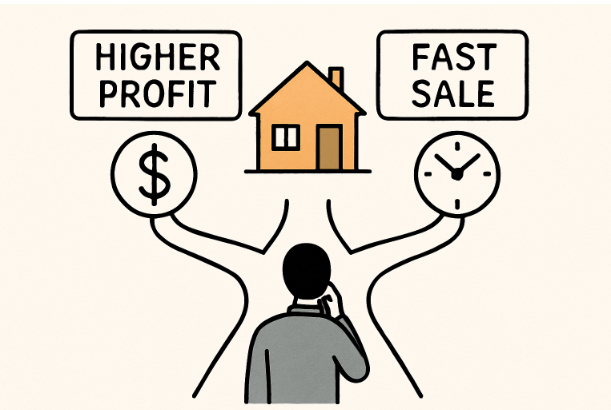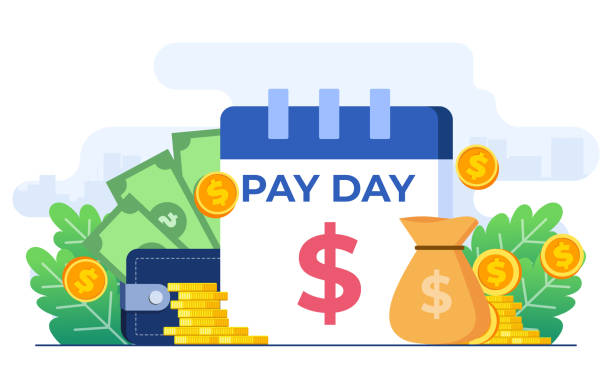Contents
- 1 Deciding Between Speed and Profit in Home Sales
- 2 The Pressures Driving a Quick Sale
- 3 Financial Calculus: Evaluating the True Cost of Waiting
- 4 Streamlined Sales: The Allure of Simple Closings
- 5 Personal Circumstances: When Speed Trumps Dollars
- 6 Market Trends: Is a Fast Sale Becoming More Common?
- 7 Weighing the Pros and Cons
- 8 Making the Best Choice for Your Situation
Deciding Between Speed and Profit in Home Sales
Homeowners frequently confront a difficult decision when selling their property: should they wait out the market to secure the highest possible price, or is it better to close quickly and move on? As the housing market evolves, it’s not uncommon to weigh the benefits of earning extra profit against the convenience and certainty that a rapid sale brings. This dilemma becomes even more pronounced in fluctuating markets or when personal circumstances limit your options.
Recent data shows that across the U.S., the average time a home spends on the market is about 54 days, according to Redfin, and every additional day can carry financial and emotional costs. Add to this the diverse motivations driving a rapid sale—ranging from job relocations to unexpected inheritances—and it’s clear why many sellers seek as-is buyers as a practical solution. These companies offer cash for homes in any condition, often closing in days instead of weeks or months.
The Pressures Driving a Quick Sale
Life rarely moves in predictable patterns, and changes can necessitate swift decisions. Major drivers of fast home sales include job relocations, foreclosure threats, and the complexities of managing inherited property. For many sellers, the ability to close fast offers peace of mind and eliminates weeks or months of uncertainty. Divorce, health challenges, or sudden financial emergencies often require immediate liquidity, making riding out the market for top dollar unfeasible.
The stress of owning a vacant or inherited home accumulates quickly: property taxes accrue, maintenance needs increase, and insurance costs mount. Simultaneously, the emotional toll of property uncertainty can impact health and quality of life. In such situations, the financial calculus of “waiting for a better price” becomes less appealing, and the certainty of a quick closing is a relief.
Financial Calculus: Evaluating the True Cost of Waiting
While holding out for a higher offer may be tempting, waiting can be expensive. Monthly expenses like mortgages, utilities, insurance, property taxes, and repairs add up, especially if the property remains unsold for weeks or months. Market volatility further compounds risk; a house listed for too long can lose appeal, leading to eventual price cuts.
According to research from NerdWallet, homeowners face an average of $2,000 to $3,000 per month in carrying costs. Delaying a sale for a $10,000 bump in price may not make sense if it takes several months and the market cools.
Streamlined Sales: The Allure of Simple Closings
Many sellers opt for cash buyers or “as-is” programs because of their simplicity. There’s no need for appraisals, home inspections, or lengthy negotiations—offers are typically made based on property conditions, and closings happen in as little as 7 to 14 days. While these sales might yield slightly less than traditional listings, they spare sellers the uncertainty and hassle of marketing, repairs, and open houses.
Industry studies, like those cited in the Forbes analysis, show that seller satisfaction with streamlined processes remains high, particularly among those facing urgency. These sales models are increasingly popular, as technology and marketplace competition create more options for homeowners to exit on favorable terms.
Personal Circumstances: When Speed Trumps Dollars
Consider the recently divorced couple who needs to liquidate shared assets quickly, or the heir managing an out-of-state property that’s too far to maintain. Foreclosure threats and imminent job changes can make every day on the market feel riskier. In these moments, speed isn’t just a luxury—it’s a necessity.
Personal narratives highlight that profit, while important, isn’t always the highest priority. Homeowners in challenging situations frequently cite relief from stress and simplified logistics as the main motivations for choosing certainty over price.
Market Trends: Is a Fast Sale Becoming More Common?
Across the nation, home sale timelines are shortening, spurred by the rise of online platforms and instant-buying models. The ability to receive a fair offer and close in a matter of days has changed seller expectations, particularly in competitive or “hot” markets.
According to Forbes, many cities now see homes going under contract within a week. With major platforms enabling fast transactions and investors ready to close, what once seemed unconventional is increasingly mainstream.
Weighing the Pros and Cons
- Advantages: Certainty of closing, less stress, lower carrying costs, and fewer repair/marketing obligations.
- Potential Downsides: Potentially lower sale price, limited room for negotiation, and fewer buyer protections in some models.
Decision Frameworks for Sellers
- Assess urgency: Are external factors requiring a fast sale?
- Calculate carrying costs vs. the possible increase in offer by waiting
- Measure personal stress and lifestyle priorities
- Consult with real estate professionals or advisors for guidance
Making the Best Choice for Your Situation
Choosing between speed and maximum profit is more than a financial decision—it reflects personal goals and circumstances. While holding out for a higher sale price can be appealing, hidden costs and emotional strain may tip the scales in favor of a quicker sale. Evaluate your needs, timeline, and the realities of your market before choosing. Seek out trustworthy professionals and use credible resources to ensure you’re making an informed decision that fits your unique circumstances.




